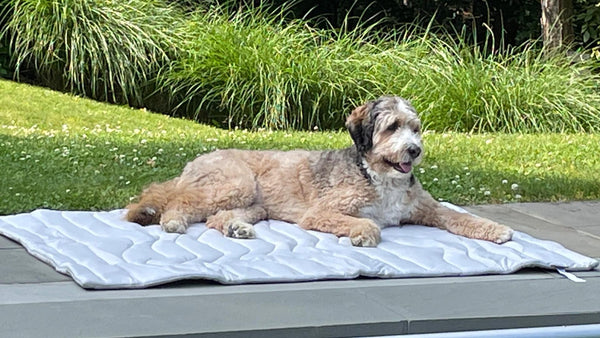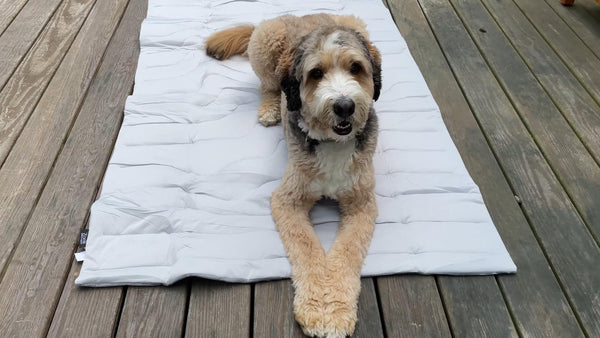As our beloved dogs age, their sleep patterns can often change, leading to restless nights for both pet and owner. If you notice your senior dog pacing at night or waking up frequently, you might be searching for solutions to help your furry friend get a good night's rest.
In this comprehensive guide, we'll explore practical steps and helpful tips on how to get your old dog to sleep through the night, ensuring comfort and rest for your aging companion.
Understanding the Struggle of How to Get Your Old Dog to Sleep Through the Night
As dogs age, they experience physical and mental changes that can affect their sleep. Understanding these changes is the first step in helping your pet.
Age-related conditions like arthritis can cause pain, while cognitive decline can lead to confusion and anxiety at night. Additionally, senior dogs may have more difficulty regulating their body temperature, which can disrupt their sleep cycles.
Creating a Comfortable Sleep Environment
A supportive and comfy sleeping area can significantly improve your old dog's sleep quality. Invest in an orthopedic dog bed that supports joints and bones.
Place the bed in a warm, quiet corner of your home, away from high-traffic areas. A heated pet mat can provide warmth and comfort to older dogs, especially during colder weather or for those with arthritis or other conditions that cause discomfort in cold temperatures. It can help alleviate stiffness in their joints and promote relaxation, improving overall comfort and quality of sleep.
On the other hand, a cooling pet mat can help regulate body temperature in older dogs, especially during warmer weather or for those prone to overheating. It provides a cool surface for them to lie on, helping to prevent heat-related issues such as dehydration or heatstroke. This can be particularly important for older dogs that may have difficulty regulating their body temperature effectively.
Establishing a Nighttime Routine
Routine is comforting for dogs of all ages, especially seniors who might be coping with cognitive decline. Establish a consistent bedtime routine that includes a short, gentle walk in the evening to help them wind down.
Follow this with a quiet period of relaxation, perhaps with some soft petting or a calm talk, to signal that it's time to settle down for the night.
Managing Diet and Health for Better Sleep
Diet plays a crucial role in how well your dog sleeps. Feeding your senior dog a balanced diet appropriate for their age, weight, and health can prevent discomfort during the night.
Avoid feeding your dog late in the evening, as this can lead to digestive issues that might disturb their sleep. Regular check-ups with the vet will also help manage any underlying health issues that could be affecting your dog's sleep.
How to Get Your Old Dog to Sleep Through the Night with Calming Aids
Several over-the-counter aids can help soothe your dog and promote better sleep. Natural supplements like melatonin or CBD oil should be considered, as they have been shown to help dogs relax and sleep more soundly.
Always consult your veterinarian before introducing new supplements to your dog’s routine. Calming dog beds, designed to mimic the comfort of a mother's fur, can also be particularly soothing for anxious seniors.
Training and Behavioral Techniques
Behavioral techniques can be effective in helping your senior dog sleep through the night.
Gentle training can alleviate nighttime anxiety, like teaching your dog to go to bed on command or using a calming, reassuring voice. Crate training is another option for dogs that feel more secure in a confined space.
The Impact of Sensory Health on Sleep
As dogs age, their sensory capabilities often decline. Diminished sight and hearing can cause disorientation and anxiety, particularly during the darker hours of the night when these senses become crucial.
To help your senior dog, maintain a well-lit environment to prevent disorientation. Soft lighting that mimics twilight can provide comfort without disrupting its sleep cycle.
Additionally, keeping some background noise, like a quiet radio, can help those with hearing loss detect less abrupt changes in the household’s sound environment, promoting a sense of security.
Exercise and Its Role in Sleep Quality
Physical activity is beneficial for dogs of all ages, but for seniors, it’s about finding the right balance. Too little exercise can lead to pent-up energy, making it difficult for your dog to settle down at night.
On the other hand, too much activity can be taxing on their aging bodies. Aim for moderate, low-impact activities like leisurely walks or short sessions of play that don’t overexert your pet but still tire them out pleasantly by bedtime.
Addressing Nighttime Bathroom Needs
Older dogs often need to relieve themselves more frequently due to age-related changes in kidney function or issues like diabetes. This need can disrupt their sleep and, subsequently, yours.
To help manage this, consider a late evening bathroom break as part of their nightly routine. If the problem persists, a well-placed indoor doggy bathroom with pee pads or a turf pet potty can provide relief without requiring them to go outside, which can be especially useful in inclement weather or if you live in an apartment.
The Benefits of Social and Mental Engagement
Cognitive decline can affect your dog's sleep patterns by causing confusion and anxiety. Engaging your dog’s mind with appropriate mental exercises can help combat this.
Puzzle feeders, scent games, and gentle, interactive play can keep their minds sharp and help alleviate the stress and anxiety that might prevent them from sleeping soundly.
Also, consider social interactions with other dogs and humans, which can comfort and reduce your senior pet's feelings of isolation or stress.
When to Consult a Veterinarian
If your efforts at home do not seem to improve your senior dog’s sleep, it might be time to consult a veterinarian. Persistent sleep disturbances can indicate underlying health issues that need professional attention.
Your vet can offer solutions tailored specifically to your dog’s needs, including medication for pain management or therapy for anxiety.
Conclusion: Embracing the Night with Care and Understanding
Figuring out how to get your old dog to sleep through the night may require a combination of approaches, from adjusting their physical environment and daily routines to addressing medical issues and providing emotional support.
Each dog is unique, and what works for one might not work for another. Continually observing and adapting strategies will help you find the perfect balance to ensure your beloved companion enjoys restful nights.




1 comment
To help your senior dog sleep through the night, focus on creating a comforting sleep environment and establishing a consistent nighttime routine. An orthopedic bed can ease joint pain, while heated or cooling mats can regulate body temperature. Develop a calming evening routine with a gentle walk and quiet time to signal bedtime. Monitoring and addressing any age-related health issues with your vet can also improve your dog’s sleep quality.